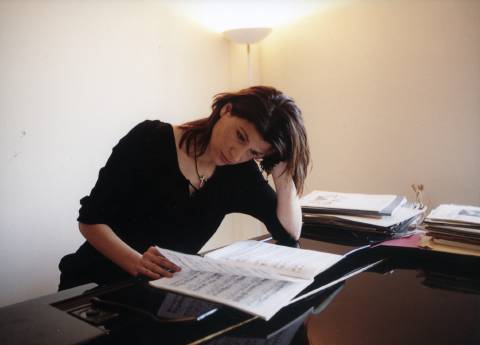|
<< -- 4 -- Bill Newman MUSICAL SOUNDS AND COLOURS

Growing up a-pace
Did you feel gradually that your life had reached a new phase?
'At some moment following the repetition and practise. This can make you uncertain at first, then, suddenly it became clear by magic, particularly in my twenties. I was so confused with music that I didn't know what to do. For a couple of years I was very disappointed, then I discovered that notes and phrases occasionally fell into place by themselves. But during my really "down" moments I would blank my mind and concentrate on technique, instead. When I first entered the Conservatory and found I was unable to make music. I read books instead on different subjects, interacted with people. After a while this eventually unblocked my mind. Before I went to sleep I found that my perspective had changed. Going to the piano, I certainly played differently.

Eugenia Papadimas
|
'Music and technique are one and the same, and you have to develop your technique in order to become musical. Different teachers teach various techniques, and this becomes the tricky part when you change your own teacher. Then you become confused, especially when you are young and require more than one.' Later, with James Gibb at London's Guildhall, she was forbidden to perform music, allowed only to hone her technique by the complete mastery of playing scales during her first year post graduate studies. 'Now, I realised why he was so tough!' Then he taught her to relax, making her sit lower on the piano stool, where beforehand she was too high with the shoulders bent to increase playing intensity. Gradually, her back moved to the straight up position, relaxing the neck muscles that controlled the arm movements and activated supple wrists connected to free flowing fingers. You have to think ahead without interrupting your musical discourse. 'This is the way we should play and what we all aim to achieve, although it is not necessary to think that way every time we perform. Your mind is one bar ahead, while your fingers are one bar behind. To succeed every time, is something else.'
Preparation of programmes that contain different composer styles from various periods must be very challenging.
'This is most hard, and can only be offset by constant practise. Jimmy Gibb tells me that you can only play a single note when you are completely in the right frame of mind. You begin to develop that from the moment you start practising.' The conductor Wilhelm Furtwängler explained that the full emotional message has to be there from the first rehearsal with the players; straight away, in order that one can judge beforehand how the finished performance will sound. 'This is surely closely linked to the expertise of performers. According to their perception of the score and perspective as human beings generally, some will grasp it easier than others. In Mozart and Beethoven this is pre-dominant. Both are master composers, the one who composed spontaneously, the other who thought a great deal by sketching out his thoughts and ideas before committing the final work to manuscript.
'The performance is the same. It doesn't matter that it may not come to you naturally, the result is more important. After isolating the technique factor, you study the whole work to obtain an overview. You can have a perfectly correct performance with no feeling -- in other words it will be cold. Obviously, you have to master the piece, but at the end of the day it has to be musical.' On the spur of the moment you might communicate something that was not there during the rehearsal. 'I have done that. I don't think I have ever played any work the same way twice.' According to your mood of the moment, are you easily distracted? 'One should get on with the performance, whatever the circumstances'.
Having estimated the audience response to your interpretation, do you often modify your viewpoint, or completely change your approach next time round.
'Everyone knows that I am never satisfied, and I always value Jimmy Gibb telling me never to listen to the prayers of the audience, or statements by the critics. Comments like "You were marvellous!", when you yourself knew you were not.' Constructive criticism is more often useful. 'Certainly, but to be successful you must isolate yourself totally during the performance. Otherwise, you lose concentration, relaxation, control and end up disconsolate.' The intransient medium between artist and listener separates the members of the audience who stay behind in the hall from the remainder who have already left.
Continue >>
Copyright © 5 December 2004
Bill Newman, Edgware UK

|

